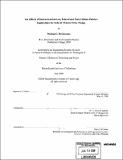| dc.contributor.advisor | A. Denny Ellerman. | en_US |
| dc.contributor.author | McGuinness, Meghan | en_US |
| dc.contributor.other | Massachusetts Institute of Technology. Technology and Policy Program. | en_US |
| dc.contributor.other | Massachusetts Institute of Technology. Engineering Systems Division. | en_US |
| dc.date.accessioned | 2008-11-07T19:12:49Z | |
| dc.date.available | 2008-11-07T19:12:49Z | |
| dc.date.copyright | 2008 | en_US |
| dc.date.issued | 2008 | en_US |
| dc.identifier.uri | http://hdl.handle.net/1721.1/43181 | |
| dc.description | Thesis (S.M. in Technology and Policy)--Massachusetts Institute of Technology, Engineering Systems Division, Technology and Policy Program, 2008. | en_US |
| dc.description | Includes bibliographical references (p. 86-88). | en_US |
| dc.description.abstract | In the absence of a federal policy to cap greenhouse gas (GHG) emissions many states are moving forward with their own initiatives, which currently range from announcements of commitments to reduce greenhouse gases to a regional multi-state cap-and-trade program slated to begin in 2009. As development of federal climate policy moves forward, federal policymakers must address how legislation or regulation capping GHG emissions will define the relationship between a federal cap and any existing state programs, particularly when state programs involve cap-and-trade. This thesis attempts to inform the policy debate on treatment of state programs under a federal cap-and-trade program through analysis of the economic, environmental, and distributional impacts of potential relationships between federal and state climate programs. Using economic theory, it considers the impacts and resulting implications for federal program design of four possible scenarios relating state and federal cap-and-trade programs: coexistence of state and federal programs resulting in separate but overlapping allowance markets; express federal preemption of state cap-and-trade programs; separate existence of state and federal programs via a 'carve-out' of the state program; and linkage between the federal program and carved-out state programs. This thesis demonstrates that the impacts of potential state and federal program interactions depend on the relative stringency of the federal and state program and overlap in source coverage. Common design elements of cap-and-trade programs, such as cost containment provisions, affect this interaction through their impact on relative stringency. | en_US |
| dc.description.abstract | (cont.) Where state programs are both duplicative of and more demanding than the federal cap, the effect is redistributive of costs and emissions; in-state sources face higher marginal abatement costs, leading to a loss of economic efficiency. These effects are avoided under either federal preemption of duplicative state programs or a 'carve-out' of state programs from the federal cap with linkage to the federal allowance market. While preemption is administratively straightforward for the federal government, it may come at a high political cost. On the other hand, the carve-out with linkage, while likely more politically feasible, may carry a high administrative burden. Policymakers determined to avoid the inefficiencies of overlapping programs will need to consider the tradeoffs between these two options. | en_US |
| dc.description.statementofresponsibility | by Meghan C. McGuinness. | en_US |
| dc.format.extent | 88 p. | en_US |
| dc.language.iso | eng | en_US |
| dc.publisher | Massachusetts Institute of Technology | en_US |
| dc.rights | M.I.T. theses are protected by
copyright. They may be viewed from this source for any purpose, but
reproduction or distribution in any format is prohibited without written
permission. See provided URL for inquiries about permission. | en_US |
| dc.rights.uri | http://dspace.mit.edu/handle/1721.1/7582 | en_US |
| dc.subject | Technology and Policy Program. | en_US |
| dc.subject | Engineering Systems Division. | en_US |
| dc.title | The effects of interactions between federal and state climate policies : implications for federal climate policy design | en_US |
| dc.type | Thesis | en_US |
| dc.description.degree | S.M. | en_US |
| dc.contributor.department | Massachusetts Institute of Technology. Engineering Systems Division | |
| dc.contributor.department | Technology and Policy Program | |
| dc.identifier.oclc | 255578436 | en_US |
